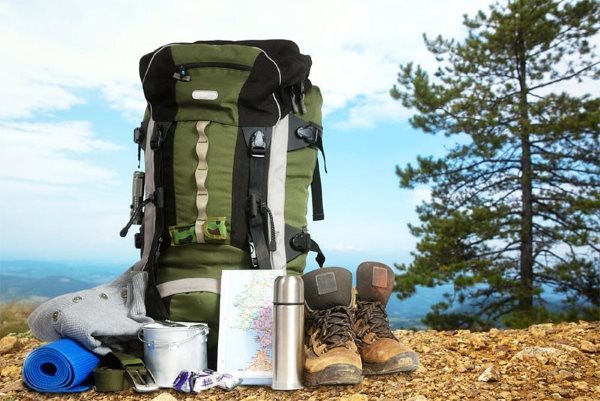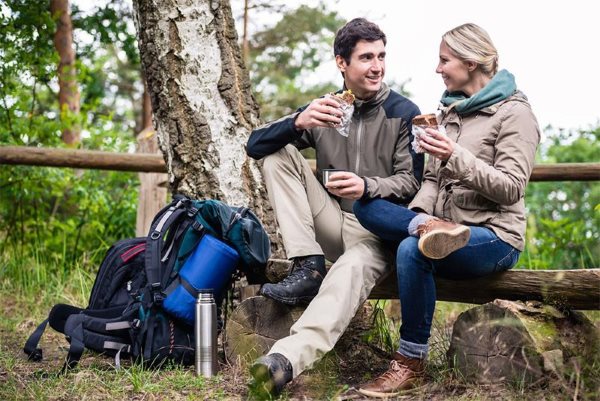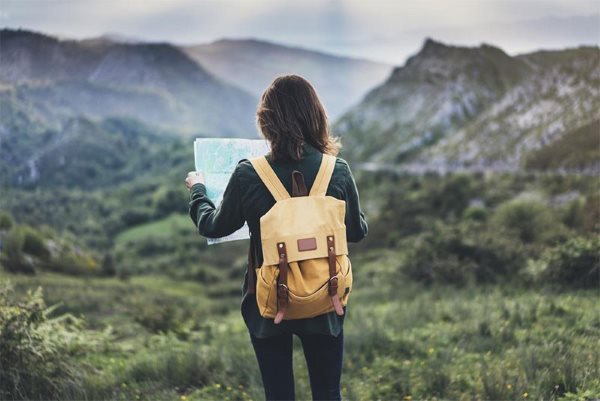Hiking is an excellent outdoor activity. It helps (forces, rather) you to get in shape and it’s also a great stress reliever. However, hiking for beginners can spark hesitation instead of a sense of wonder because either they don’t know what to expect or they’re afraid of getting lost. Hence, this post is intended to give you a list of top hiking tips for beginners.
Common fears plague the mind of first-time hikers. “I’m afraid of bears… I’m afraid of getting lost… I’m too old for walking long trails… I’m not in my best shape now… ” are just some of the many concerns we frequently hear from people who have never hiked before.
These fears are completely normal, and you’re not the only one who thinks that way. We’re here to assure you that there’s nothing to be afraid of. If there’s one that’s great thing about hiking, is that it helps overcome your fears and makes you have the guts to take more risks. A valuable skill in life.
You know when they say that if you’re stressed or fed up with something… take a walk? We say, take a hike! As avid hikers, these are things we’ve experienced first-hand, and also, there are some easy to make beginner mistakes, we wouldn’t want others to make.
So, in this post, we’ll lay out the best tips novice hikers should take note of, including the proper gear and clothing, as well as some guidelines for picking your first trail.
Top Hiking Tips for Beginners
1. Pack Your Backpack Properly

One question that we get a lot from people, is on how to pack a backpack. Instead of throwing everything in your pack without giving it a second though, it’s imperative to know how to pack it the right way.
There are a lot of things to take into consideration when packing. That includes the pack’s capacity, duration of the trip, weight distribution, and the organization of things inside and outside the pack.
For instance, if you’ve planned a 4-day camping/hiking trip, your backpack should at least have a 50-80 liter capacity to hold all your hiking gear for four days. It’s also important to bear in mind that since it’s your first time, you should carry fewer things – don’t attempt to carry weight like a seasoned pro.
You need to gauge the average weight and capacity your body can carry first.
The most important thing to bear in mind when packing your backpack, is the organization of things. The bulkier things like sleeping bags and pads should go in the bottom zone of the pack whereas clothes, snacks, and the things you frequently snatch out should be placed in the top region.
2. Find Someone To Hike With
Since it’s your first hiking trip, you might want to be accompanied by someone who is knowledgeable in the noble art of hiking. Better yet, hike with a group. Join the local hikers’ club in your area, since most clubs lead frequent hikes that are open for anyone to join.
As a matter of fact, the fastest way to learn how to become a good hiker is to hike with other hikers. Aside from the fun you’ll be experiencing with making new friends, you’ll also hear a handful of lesson-filled stories and experiences from them.
Hiking with others is like hitting two birds with one stone – making lifelong friends and learning hiking without making painful newbie mistakes that make the first trip needlessly hard!
3. Bring Snacks & Water

No matter how far you are hiking, it’s necessary to refuel now and then. For starters, bring sufficient healthy snacks that won’t bring in too much weight to the pack such as trail mixes, fruits, and energy bars.
If you plan to camp out for a couple of days, bring a handy cookware set and choose easy to prepare foods like oatmeals, noodles, and canned goods. You may also bring pre-sliced meat cuts and vegetables for variety.
With regards to water, beginner hikers often don’t carry enough. If you’re going for a day hike, bring about 4 to 5 liters of water because you have to hydrate for about every 30 minutes as you go along.
It also depends on the season and your body’s needs. You might need less water during winter months and more during summer. Also, if you’re a heavy water drinker like us, you might want to bring additional bottles.
Most importantly, carry a water purifier with you at all times. It can be a filter, iodine tablets, or a handy stove for boiling.
4. Carry Essential Things
Being thoroughly prepared when hiking is the best thing you can do for yourself. It eliminates most inconveniences and makes you more comfortable and at ease when camping.
When hiking during the summer, you can ditch insulated garments and stick to moisture-wicking shirts, hiking pants or shorts, and hiking boots and fast-drying socks.
Below’s a guide of the essential things to bring when hiking.
| Category | Essentials |
|---|---|
| Navigation | Trail maps, GPS, compass, watch |
| Sun protection | Sunscreen, sunglasses, hats/caps |
| Insulation | Rain jacket, insulated jacket, beanie hat |
| Illumination | Headlamp/flashlight |
| Emergency | First aid kit |
| Creating fire | Matches/lighters, cotton balls soaked in petroleum jelly |
| Handy tools | Swiss knife |
An indispensable skill everyone needs to acquire whether you’re fond of the great outdoors or not is starting a fire from scratch. This is extremely helpful when camping and during emergencies.
Sure, it’s easy to build a fire when the ground is dry and there are fallen twigs everywhere but what if it just rained and the ground is wet? You’ll probably ask us how to start a fire with wet wood.
It’s real easy and straightforward as long as you can find a pile of tinder, kindling, and logs. Even if they’re wet. You’re require a little bit more kindling for wet logs, and a whole lot more patience.
5. Use Maps When Hiking A Trail

Choose a particular trail beforehand and obtain a topographical map of the area, as well as read reports and data about the trail if any. You may consult the internet or the local hikers in your area for reliable sources.
Designated trail maps are one of the frequently used hiking maps because they feature topographical parameters and vital info such as hiking mileage and trailheads. You can secure trail maps and guidebooks on your local bookstore or visitor centers.
Once you have obtained a trail map, note whether the trail is looped or needs some backtracking. Also, check any intersecting trails to avoid potential wrong turns. When checking out trail maps, we also prioritize scouting for relaxing lunch spots like nearby lakes or peaks with magnificent views.
Lastly, store your map in a sealable plastic bag in case it rains to preserve its condition. You don’t want to be guessing about where this blurry black line leads to, do you?
6. Always Check The Weather
Before setting foot on the trail, check the weather forecast days leading up to the activity. Pair your outfit and prepare additional things to pack according to the weather.
If the weather condition is purported to be awful, it will give you the chance to change plans or make extra preparations ahead of time.
7. Tell Someone Where You’ll Be Off To
Instead of surprising your family in case something unfortunate happens, it’s best to inform someone them or your friends regarding your itinerary and what time you expect to be done.
This will give them something to worry about in case you have been delayed several hours than you planned to finish. They can send in help if ever to rescue you in the event that an accident occurred.
8. Leave No Trace Behind
As stewards of nature, our job is to protect and preserve it for future generations to enjoy as much as we did.
Practice leaving no trace behind. Stuff used plastic bags and wrappers neatly inside your pack and repackage food and other items to minimize waste.
For solid human wastes, dig a hole about 6-8 inches deep and cover it with soil, leaf litter, and other organic objects. Also, use biodegradable soap when bathing or washing dishes.
Outdoor Survival Tips
Not everything happens the way you want it to be all the time. That’s why you should have knowledge of other life-saving alternatives if ever what you have planned fails terribly or something you didn’t expect came up.
On that note, here’s a brilliant video showing unconventional survival tips that will surely help you out in times of need. We’ve learned a ton of things from this, and it boggles our minds until now that fungus makes a great fire-making tool!
Final Thoughts
Anyone need not be scared at the thought of hiking and other outdoor activities, especially beginners. In fact, you should be excited and thrilled to see the magnificence of nature!
All you have to do is to prepare yourself before embarking on your adventure. Simply read and the best tips we’ve listed in this post and you’re good to go. One of the most important things to take note of above is to notify your family or friends regarding your whereabouts and lastly, leave no trace behind.
Hey there! Is it your first time to go hiking? Have you read our tips? Is it helpful? Do comment your thoughts below! Don’t forget to share this post before you leave. Have a safe hiking trip!

0 comments